The Difference Between Keywords and Topics
Keywords don’t help organize information; topics do. Keywords can reveal different terms used to search for the same result, but they don’t capture the semantic relationship in the way that topics can.
If you’re like most content marketers, you’ve learned to view Search through the eyes of keyword research. That’s understandable given the history of Google.
In the past, the search engine focused on matching keywords on a page to a search query. However, Google continues to evolve, and what was valid five or ten years ago is no longer true. Take the case of keywords, a topic held in high regard by SEOs.
They are no longer the driving force behind Search. As Google’s John Mueller explained, “search engines will get better over time to understand more than just the words on a page.”
So, it’s time we have a serious conversation about the difference between keywords and topics. As you’ll soon discover, there’s a substantial variation in how they are used for content marketing.
This is the second chapter in our guide to keyword research. In it we cover the basics including the difference between keywords and topics, common misconceptions about keyword volume, and keyword difficulty. We delve further going from keywords to content, exploring keyword cannibalization fallacies, and conducting keyword research with MarketMuse.
Keyword Research Guide Index
- Keyword Research Guide
- The Difference Between Keywords vs Topics
- Keyword Research and The Search Volume Illusion
- What is Personalized Keyword Difficulty and Why You Need It
- How to Go From Keywords to Content
- What is Keyword Cannibalization and How to Fix It
- Using MarketMuse for Keyword Research

What Is a Topic?
According to Oxford, a topic is “a matter dealt with in a text, discourse, or conversation; a subject.”

Let’s talk about my favorite subject, “apple pie.” There’s a lot to discuss, such as:
- Ingredients
- Nutritional facts
- Recipes
- How to bake an apple pie
- Pie dough
- Baking a pie crust
- Parchment paper
- Pie plate
- All-purpose flour
- Ice cream
There’s so much more we could include in a discussion. When we put the subject into MarketMuse, this topic tool found 50 highly-related topics associated with apple pies.

Semantic relevance is key to understanding the narrative that this group of words tells. It’s also what sets apart topics from keywords, which we’ll get to in a moment.
What Is a Keyword?
Keyword is a term we often substitute for search terms. Oxford states that a keyword is “a word or concept of great significance.”

Once more, let’s take my favorite subject and plug that into a popular keyword tool to see what we get. This software offers four choices for the types of keywords returned:
- Broad match (variations of the original phrase in any order)
- Phrase match (the exact phrase in various orders)
- Exact match (use the keyword string in the exact order)
- Related (similar to the see keyword)
The first three choices are quite restrictive in that they require our initial phrase (apple pie) to be in the result. There’s no notion of semantic relevance there! The last choice offers a bit more flexibility. In theory, related keyword results don’t need to contain the initial phrase.
Let’s see how this looks.
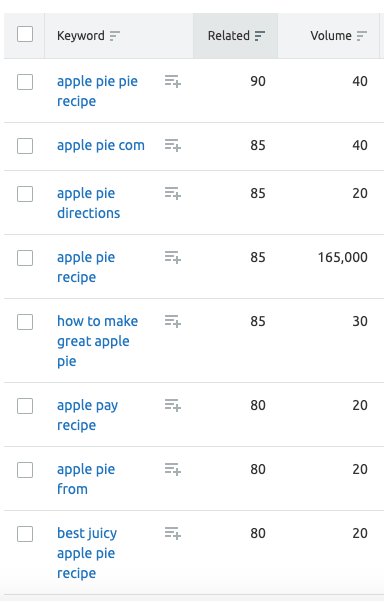
The screenshot above shows the top ten results ordered by relevance. There are over 1,500 keywords that are used as search queries, meaning they all have a minimum monthly search volume. But let’s focus on those that are the most closely related.
You’ll notice that nine out of the top 10 contain the seed term “apple pie.” For those who are curious, I looked at the other 1,500 keywords in that list. What I found was that the majority contain either the term “apple” or “pie.”
That’s interesting!
What Is the Difference Between a Topic and a Keyword?
Let’s revisit the formal definitions of topic and keyword to see if there’s a discernible difference. Here are the two definitions side-by-side. What do you think?

Call it a matter dealt with in a discourse or a concept of great significance. To many, there may be no difference; it’s a matter of tomato vs. tom-ah-to.
Fair enough. But look at the difference in output between the two approaches.
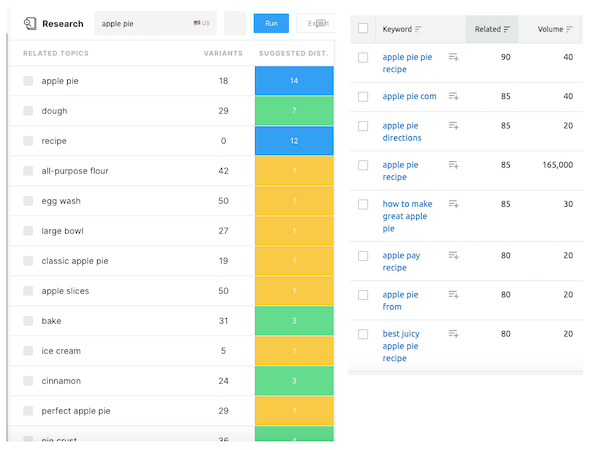
Imagine writing an article about apple pie. Most likely, you’d offer a recipe including instructions on how to make the dough, how to slice the apples along with instructions on using an egg wash to make the crust shiny.
And let’s not forget the cinnamon or that it’s best served with a scoop of ice cream on the side!
With the keyword approach, you’ve got a list of phrases like:
- Apple pie pie recipe (no this is not a grammatical error)
- Apple pie com
- Apple pie recipe
- Apple pay recipe
How are you going to create content from that? (That’s a rhetorical question.)
You’re not going to optimize your post to rank for a bunch of keywords by adding more of them. You’re going to rank for a specific topic by covering them in the normal course of conversation.
Can you rank for multiple topics?
Absolutely. Although it depends on how close the topics are and whether you’ve covered any additional topics related to the subject.

Keyword Research vs Topic Research
Using a keyword tool for the topic “guitar types” will return a list of related keywords that are simply different ways of expressing the same search term. Here’s an example from a popular keyword research tool.
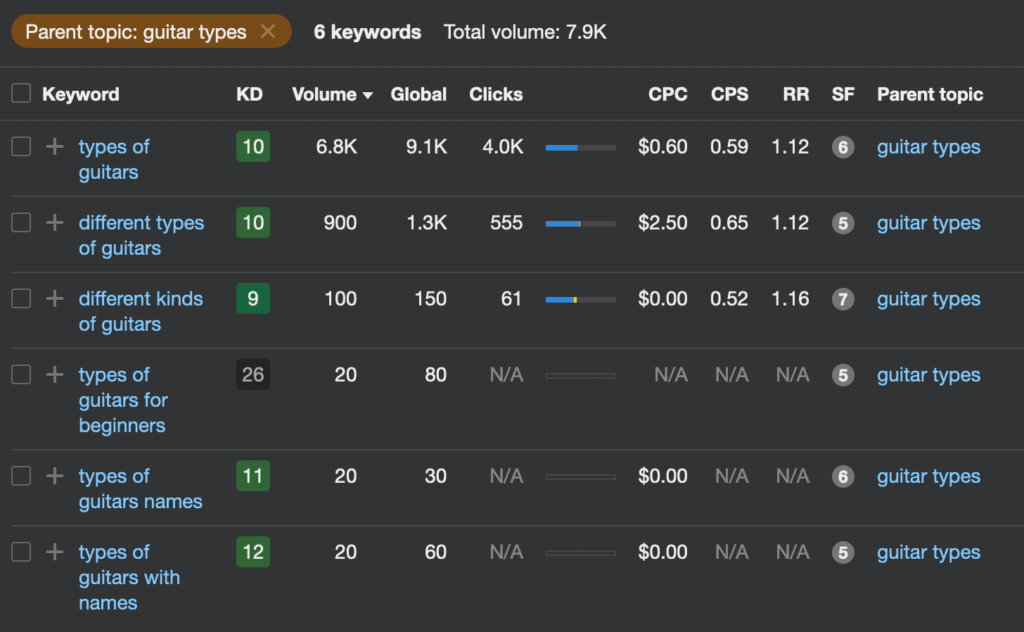
Here you’ll discover that most people use the search term “guitar types,” quite a number use “type of guitars,” while few use the term “different types of guitars” and even less so for “different kinds of guitars.” While all these may seem to be linguistically similar, you would need to verify by comparing the SERP results.
All this isn’t very helpful if you’re looking to create content around the topic of “guitar types.” And if you’re not careful, this can get you into a lot of trouble. In the past, marketers would create separate pages targeting each of these phrases with no regard for whether they served the same intent. This is where the whole keyword cannibalization problem started, with different pages competing against each other.
Occasionally, this type of research will surface something usable, such as “types of guitars for beginners.” But that’s more the exception.
Type “guitar types” into MarketMuse or another topic modeler and you’ll get related topics like “acoustic guitar,” “electric guitar,” “bass guitar,” “classical guitar,” “steel guitar,” “Les Paul,” “flamenco guitar,” etc. Now you have a map of topics around which to create content. Some of these topics will require multiple pages, in which case you can apply this process recursively. In the case of MarketMuse, it presents a list of related topics sorted by semantic relevance, which can help prioritize your content creation.
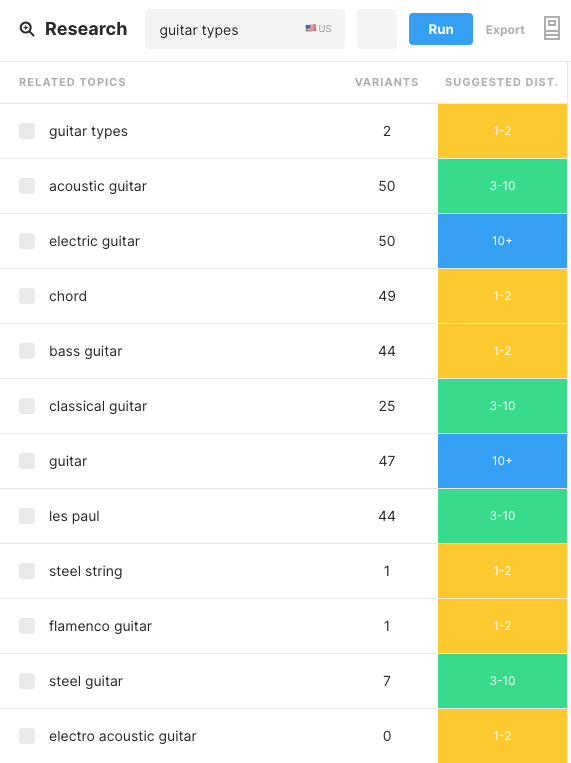
What Happens When You Confuse Keywords With Topics
In any Writing 101 class, you quickly learn that every article requires just one focus topic. Everything else needs to support your main argument.
Keywords aren’t topics and when you treat them like they are, it’s a recipe for disaster.
I recently came across a content brief template – I have a swipe file of manual templates, so I’m always on the lookout for more. This one was unusual in that was filled with real data. Manually created, it’s not surprising that it didn’t use any topic modeling but instead offered a ‘target keyword,’ along with nine ‘supporting keywords’.

Being spoiled by MarketMuse’s patented topic modeling technology, I had many questions, like:
- How are these keywords related?
- What exactly is meant by supporting?
- How do I use them?
- Are these keywords included in the belief that mentioning them will help rank the content?
- Does the brief creator think that the terms are similar?
- Would including these terms improve the article?
I did some analysis to establish what top ranking pages, if any, mentioned those supporting keywords. I also verified SERP similarity to see how many top results for the target keyword also appeared in the SERPs for the supporting keywords.
If the creator of this brief is believes that the keywords are similar, and that mentioning them affects ranking, then that should reflect in the results.
I’ve summarized the results below, and here’s what I found:
- Few of the top ranking pages mention those supporting keywords. In fact, none of the top 20 pages for the phrase “SEO technology start up” even mention the term!
- SERP similarity (comparing the target keyword SERP against each supporting keyword SERP in pairs) indicates the phrases are not very homogeneous. Similarity in the SERP hovers around 50/50 with the most extreme case being 0% for the phrase “startup SaaS SEO.”
- SERP similarity for the phrase “SEO for startup” registers at 75%. One way to look at this is that Google figures, 3 out of 4 times, searchers using the term “SEO for startup” will be satisfied with the results in “the SEO for startups” SERP.
Personally, I think when someone includes multiple keyword phrases in their content brief, they’ve moved into the realm of SEO content. And that’s far different from people-first content that’s optimized for search. Just something to think about in light of Google’s Helpful Content Update.
Keywords Vs Topics Example
Topic modeling is a much better approach for content creation, because it takes into account the broader context and themes within a body of text. With topic modeling, you’re looking at a larger set of data and identifying patterns and relationships among the words and phrases, rather than just grouping a few keywords together. It’s like the difference between a high school book report and a dissertation – one is superficial, while the other digs deep and uncovers richer insights and meaning.
Here’s an example of what I mean.

For a page targeting “average car accident insurance settlement” we have a list of grouped keywords — the output from a well-known keyword research tool. The supporting keywords are essentially variants of the main topic. They’re different ways of saying the same thing. A few terms, “minimum settlement car accident” and “no surgery car accident claim amount” have a substantially different meaning.
Although there’s no specific guidance on how to use these terms, my interpretation is that a writer would somehow incorporate these keyword phrases into their page on “average car accident insurance settlement.”
Do that and you end up saying the same thing 20 different ways while conveying no substantial information.
Contrast that with a topic model that shows different concepts related to the subject. If I want to thoroughly cover “average car accident insurance settlement” I’ll need to talk about everything that factors into the calculation:
- Economic damage
- Non-economic damage
- Property damage
- Punitive damages
- Physical therapy
- Injury severity
- Plus I’ll need to explain the difference between a settlement offer and a settlement amount.
That’s what it really takes to cover the subject thoroughly.
Why You Need to Start Thinking About Topics Instead of Keywords?
Keyword research doesn’t help create better content, and a bigger list won’t solve the problem. Fifteen hundred keywords (most of which contain either “apple” or “pie”) don’t help. Instead, they hinder the creation of expert-level content.
Topics help you focus on the critical matters that are dealt with in a conversation on the subject. Keywords? Not so.
That’s why writers struggle to fit keywords into their narrative. The goal isn’t to optimize keyword usage, it’s to ensure thorough coverage of a topic.
If that’s not enough to convince you, then take a moment to think about Google’s mission statement, which is to “organize the world’s information and make it universally accessible and useful.”
Last year Google announced a new “topic layer in the knowledge graph.” Notice that they don’t refer to it as a “keyword layer.” Is anyone willing to venture a guess why?
Here’s what a topic layer looks like. Available on mobile searches since last year’s announcement, it’s starting to roll out to desktop queries.
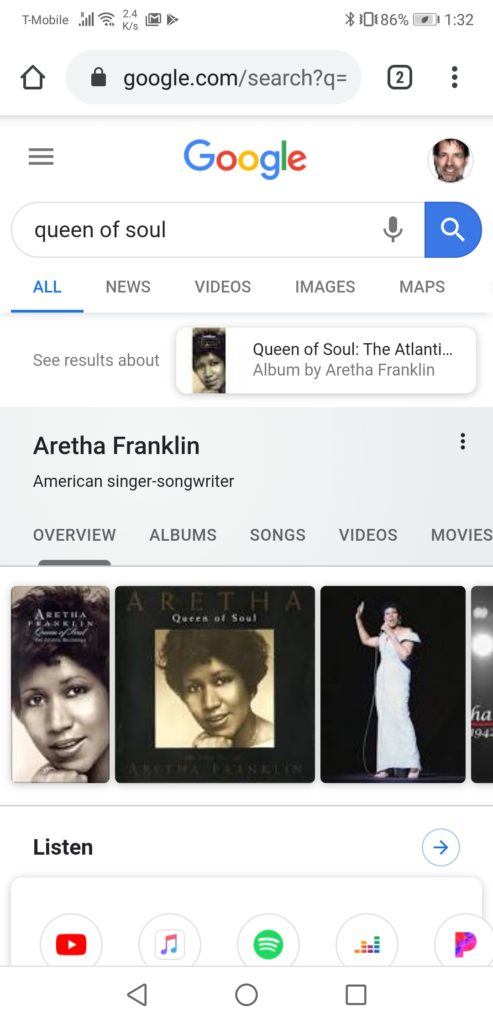
Google has organized the SERPs into several topics, all related to the queen of soul herself, Aretha Franklin. If you’re writing content on this subject or any subject for that matter, you will do well to take a topical approach
Take Away
Theoretically, keywords and topics should be the same. But in practice, they are like night and day. On-page search engine optimization focuses heavily on keyword phrases. Unfortunately, keyword research tools don’t help you deal with those essential matters in your content. For that, you need a platform built from the ground-up with a topical focus.
Editor’s note: This article has been updated offering an additional example of the difference between keywords and topics.
Keyword Research Guide Index
- Keyword Research Guide
- The Difference Between Keywords vs Topics
- Keyword Research and The Search Volume Illusion
- What is Personalized Keyword Difficulty and Why You Need It
- How to Go From Keywords to Content
- What is Keyword Cannibalization and How to Fix It
- Using MarketMuse for Keyword Research
What you should do now
When you’re ready… here are 3 ways we can help you publish better content, faster:
- Book time with MarketMuse Schedule a live demo with one of our strategists to see how MarketMuse can help your team reach their content goals.
- If you’d like to learn how to create better content faster, visit our blog. It’s full of resources to help scale content.
- If you know another marketer who’d enjoy reading this page, share it with them via email, LinkedIn, Twitter, or Facebook.
Stephen leads the content strategy blog for MarketMuse, an AI-powered Content Intelligence and Strategy Platform. You can connect with him on social or his personal blog.